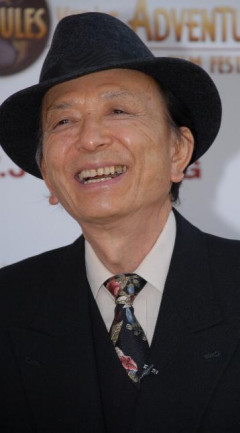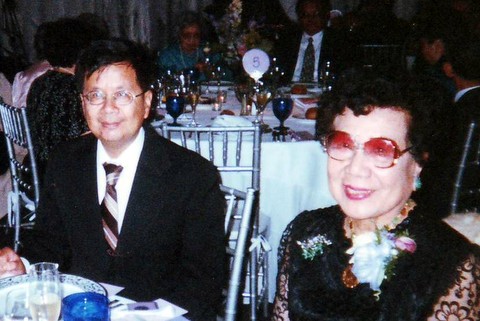Spotlight
James Hong, Veteran Actor Receives His Star on Hollywood's Walk Of Fame! 2022 is a Year of Great Firsts for Asian Americans in Hollywood
A Few Words about Burton Fong-Torres 1949-2012 by Ben Fong-Torres
San Francisco
Burton, My Brother
by Ben Fong-Torres
The hardest part about losing a sibling – or anyone close to you, come to think of it – is having to go out and see friends and hear those most innocent of questions: “What’s new with you?” or “How’re you doing?”
Depending on who’s asking, I’ve been saying, “All right, thanks, and you?” or “Not so great. My younger brother died.” And then you gird yourself for the questions and sympathy, and you let out a couple of details, and try to figure out a transition to another subject; any other subject.
That’s how it’s been since November 11th, the Sunday of Thanksgiving week. Burton, who was 63 and the youngest of us five children, died after several years of living with a weak heart, helped not at all by kidney dialysis. Since childhood, Burton was slow, and did not advance far, in school or in life. Later in life, he had no friends. And so, when he passed away, we, his family, chose not to have a service. Our mother, 91, is in nursing care and in no shape, physical or mental, to be attending a funeral for the third child she has lost.
So, no obituary, no service, no facebook page, as we had for my sister Shirley, who died in June of last year. She was a public person, constantly in the media. Burt was the flip side.
But he was vitally important in our family. As a close friend wrote, “Looking back, Burton was a blessing for your family. He was the one who kept your parents company.” At the Bamboo Hut, our restaurant in Hayward, after the older kids had finally escaped to college and beyond, Burt stayed and helped out until our parents closed it in the mid-‘70s. After our father died in 1994, Burton, who by then had ended an arranged marriage with a woman from Hong Kong, moved into my parents’ condo in Oakland’s Chinatown. It was an unorthodox arrangement, a 45 year old son moving in with his 73 year-old mother. But, in many ways, they needed each other.
Even when both were ailing, they were helpmates, caregivers to one another. When my mother was forced to move into skilled nursing, last fall, it didn’t take long to confirm that Burton was incapable of living on his own and taking care of himself.
He may have had heart problems, but he had a good heart—to a fault. He couldn’t say no, whether to community groups—say, a reunion of Lincoln School—or, far more often, to scam artists.
In May, Burt, too, was admitted into skilled nursing—to Bellaken Garden, the same facility that our mother was at.
When Burton wasn’t off to dialysis, they would see each other at lunch. I’m guessing they didn’t say much. Mom can be a bit much. To the end, she’d try and tell Burton what and how much to eat. Burt, by his nature, didn’t talk. Our phone conversations lasted about as long as wrong numbers. He was always in a hurry to get off the phone. “see you later,” he’d say, once you’d gotten your message or question across. “See you later.”
Sarah, my sister, would make imaginary bets with me over how long we could keep him on the line. 40 seconds, we figured, was tantamount to a Burton Filibuster. But I could cheat; bring up the Giants or the Oakland A’s, ask about taking him to a game, and, once in a while, break the full minute mark. Then: “See you later.” I’d call Sarah and lord it over her. “A minute, fifteen.” “NO WAY!” It was like Ray Romano timing how long he was on the couch with Letterman.
Because he never said ‘No’ to sellers of magazine subscriptions, baseball memorabilia, and New Age crystals, Burton accumulated piles of clutter. But he had few real possessions. At his bedside, he kept a framed copy of a Ben Shahn drawing and quote we had given out at the memorial for our brother, Barry, who was murdered in 1972. “You have not converted a man because you have silenced him,” wrote Shahn. Barry had been a good brother to Burton; taken him to ball games and other excursions. Burt never forgot.
In summer, Sarah, her son Jason, and I would bring him copies of newspapers with coverage of the Olympics. But by the time baseball was into the playoffs, he was too tired to follow the Giants’ run into and through the World Series. He was moved from Bellaken to a sister facility, Marina Garden, in October. The move naturally upset our mother, but I did manage to drive him over for a visit one day. A short, near-wordless visit, but a visit, nonetheless. Our mother has not much more, but at least she has that memory.
Next February, for however many years it’s been since 1997, I will be co-anchoring the San Francisco Chinese New Year Parade broadcast on KTVU (and globally, online). For the last half-dozen years, I have quoted my mother’s farewell message to her family: “Everything lucky; everything good.” But next year, I will have to add a message to Burton:
See you later.






